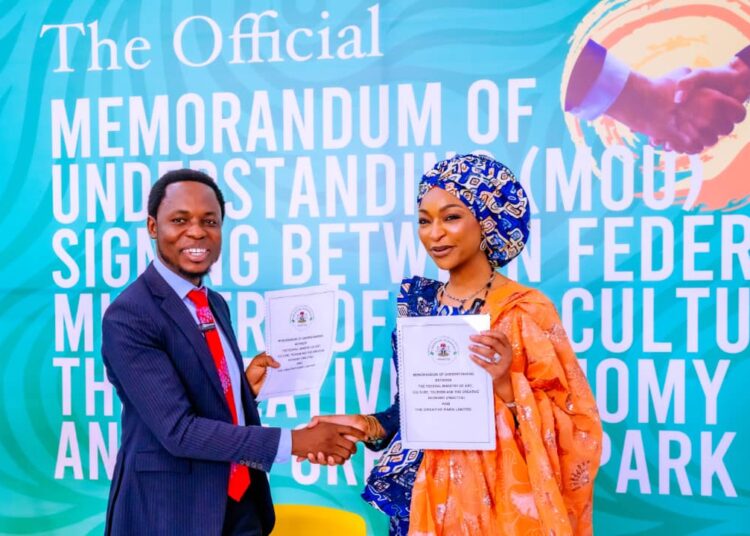In a significant move that could reshape Nigeria’s creative landscape, the federal government has partnered with Creative Park Limited to establish a 30-hectare Creative City in Abuja.
This development, sealed through a memorandum of understanding (MoU) signed by Minister of Art, Culture and the Creative Economy, Barrister Hannatu Musa Musawa and Mr. Bayo Omoboriowo, signals a promising new chapter for our nation’s cultural and creative industries.
I’ve been following Nigeria’s creative sector for years, and this partnership couldn’t have come at a better time.
Our creative talents have been punching above their weight globally – Afrobeat dominates international charts, Nollywood ranks among the world’s largest film industries, and our digital content creators are gaining millions of followers worldwide. Imagine what they could achieve with dedicated infrastructure and support systems.
The Creative Park, Idu in the Federal Capital Territory (FCT), represents more than just buildings and facilities – it embodies a fundamental shift in how we value our creative economy.
For too long, Nigeria’s development strategy has disproportionately focused on traditional sectors such as oil and agriculture, while our creative industries flourished largely through individual determination rather than institutional support.
This public-private partnership model is particularly encouraging. The Federal Ministry of Art, Culture and the Creative Economy provides the policy framework and land, while Creative Park Limited brings operational expertise and investor networks. This balanced approach addresses the sustainability concerns that have plagued previous government initiatives in the creative sector.
To be sure, Omoboriowo brings valuable experience to the table. As a former official photographer to the immediate past President Muhammadu Buhari, he understands both the creative process and the workings of government – a rare combination that should help navigate the complex terrain between artistic vision and bureaucratic reality.
When the minister stated, “The vision of President Bola Tinubu is not just about building the creative industry, it is about empowering future generations,” she touched on something profound. The creative economy has unique democratising potential. Unlike other industries with high entry barriers, creative expression is accessible to millions of Nigerians regardless of their formal education or socioeconomic background.
Think about it – a young Nigerian with a smartphone and internet connection can produce content that reaches global audiences. This park could provide the missing link – turning raw talents into sustainable careers through training, networking, and investment opportunities.
Trust our creative talents to maximise such opportunities. I’ve witnessed firsthand how Nigerian artists transform limited resources into world-class outputs. Providing them with state-of-the-art facilities could exponentially increase both the quantity and quality of their productions.
Come to think of it, establishing such a hub in Abuja makes strategic sense. While Lagos remains our commercial and creative centre, Abuja’s central location and status as the federal capital creates opportunities for nationwide representation. Creative talents from all six geopolitical zones can find a neutral ground to collaborate and cross-pollinate ideas.
The timing couldn’t be better. With digital transformation accelerating globally, creative content has become a primary economic driver and cultural ambassador. Nigeria’s rich cultural heritage, vibrant musical scene, and storytelling traditions position us uniquely to capitalise on this trend – if we can provide the necessary infrastructure and support systems.
I particularly appreciate the minister’s recognition that “we are a kaleidoscope of cultures and ethnicities, and that is what makes us one of the greatest people on earth.” This diversity isn’t just our social reality – it’s our creative superpower. Each ethnic group brings unique aesthetic traditions, narratives, and perspectives that, when combined, create an unmatched cultural tapestry.
The Creative Park’s potential impact extends beyond the creative sector. Tourism, education, technology, and manufacturing all stand to benefit from the spillover effects. Creative tourism is a growing global trend, with travellers increasingly seeking authentic cultural experiences rather than generic destinations. A world-class creative hub could position Abuja as a cultural tourism destination.
Ok, let’s put it this way – what if this initiative succeeds in attracting international production companies, streaming platforms, and technology partners? Nigeria could transition from being primarily a content creator to also becoming a content producer for the global market. The economic implications would be significant – job creation, foreign exchange earnings, and technology transfer.
The five-year timeframe for the MoU provides sufficient runway for development while ensuring accountability. This initial period will likely focus on infrastructure development and operational frameworks, with subsequent phases expanding to specialised facilities for different creative subsectors.
I completely agree with Omoboriowo’s assertion that “this partnership brings together the government, the private sector, international development organisations, and key stakeholders who share a common vision of a creative Africa that is bold, innovative, and globally competitive.” The multi-stakeholder approach increases both resources and accountability.
Personally, I believe the true measure of this initiative’s success will be its impact on ordinary creative professionals. Will it democratise access to equipment and training? Will it create pathways for talents from underrepresented regions? Will it establish structures that ensure creative workers receive fair compensation for their intellectual property?
The Creative Park represents more than just physical infrastructure – it’s a statement about Nigeria’s priorities and future direction. By investing in our creative economy, we’re acknowledging that our greatest resource isn’t beneath the ground but within our people – their imagination, innovation, and cultural expressions.
Consequently, the success of this initiative will depend on ensuring that it remains accessible and relevant to creative professionals from diverse backgrounds. The management must resist the temptation to create an exclusive enclave and instead foster an inclusive ecosystem that nurtures talents regardless of their connections or social status.
Nigeria’s creative renaissance is already underway, driven by the resilience and brilliance of our artists, filmmakers, musicians, designers, and digital creators. The Creative Park, Idu, could accelerate this movement, providing the institutional framework and infrastructure that turns individual success stories into a cohesive, sustainable creative economy worthy of our nation’s immense potential.




